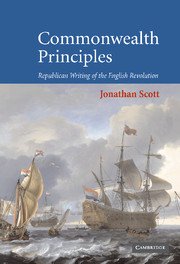Book contents
- Frontmatter
- Contents
- Preface
- Introduction: English republicanism
- Part I CONTEXTS
- Part II ANALYSIS
- Part III Chronology
- 11 Republicans and Levellers, 1603–1649
- 12 The English republic, 1649–1653
- 13 Healing and settling, 1653–1658
- 14 The good old cause, 1658–1660
- 15 Anatomies of tyranny, 1660–1683
- 16 Republicans and Whigs, 1680–1725
- Appendix: ‘a pretty story of horses’ (May 1654)
- Bibliography
- Index
14 - The good old cause, 1658–1660
Published online by Cambridge University Press: 22 September 2009
- Frontmatter
- Contents
- Preface
- Introduction: English republicanism
- Part I CONTEXTS
- Part II ANALYSIS
- Part III Chronology
- 11 Republicans and Levellers, 1603–1649
- 12 The English republic, 1649–1653
- 13 Healing and settling, 1653–1658
- 14 The good old cause, 1658–1660
- 15 Anatomies of tyranny, 1660–1683
- 16 Republicans and Whigs, 1680–1725
- Appendix: ‘a pretty story of horses’ (May 1654)
- Bibliography
- Index
Summary
Where is this goodly tower of a Commonwealth, which the English boasted they would build to overshaddow kings, and be another Rome in the west? The foundation indeed they laid gallantly; but fell into a wors confusion, not of tongues, but of factions, then those at the tower of Babel; and have left no memorial of thir work behinde them remaining, but in the common laughter of Europ. Which must needs redound the more to our shame, if we but look on our neighbours the United Provinces, to us inferior in all outward advantages; who notwithstanding, in the midst of greater difficulties, courageously, wisely, constantly went through with the same work, and are setl'd in all the happie enjoiments of a potent and flourishing Republic to this day.
Milton, The Readie and Easie Way (2nd edn, 1660).What I have spoken, is the language of that which is not call'd amiss the good Old Cause.
Ibid.THE REPUBLICAN MOMENT, 1659–1660
The failure in practice of Harrington's Oceana was not surprising. By comparison with the brief and prosaic working constitution it aspired to replace, the self-conscious wit, baroque complexity and fantastic elaboration of Oceana's ‘orders’ were hardly designed for ready absorption. That this text aspired to be not simply a constitution, but also both literature and civil philosophy (in a word, ‘art’) substantially accounts for the contested history of its reception. Accordingly, demands were soon heard for a brief translation into English (The Art of Lawgiving, February 1659).
- Type
- Chapter
- Information
- Commonwealth PrinciplesRepublican Writing of the English Revolution, pp. 294 - 314Publisher: Cambridge University PressPrint publication year: 2004



